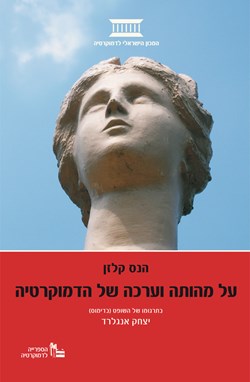The Nature and Value of Democracy
- Written By: Hans Kelsen
- Publication Date:
- Cover Type: Hardcover | Hebrew
- Number Of Pages: 111 Pages
- Price: 70 NIS
This classical work on the nature of democracy is intended to fill a lacuna in basic Hebrew literature on the system of parliamentary governance in Israel. The book is written for the educated layman and its purpose is to convince the reader that the democratic system is the best possible guarantor of human freedom. The problems discussed in this book still remain on Israel's permanent agenda: parliamentary immunity, national referenda on political issues, members of parliament defecting from their parties, cancellation of the mandate of a parliamentarian for deflecting from the party line, status of the opposition, establishment of the status of political parties in law, etc.
This classical work on the nature of democracy is intended to fill a lacuna in basic Hebrew literature on the system of parliamentary governance in Israel. The book is written for the educated layman and its purpose is to convince the reader that the democratic system is the best possible guarantor of human freedom. Even though the book was written at the end of the 1920s with the aim of protecting its ideological opponents from left and right, it has an impressive relevance to current problems of governance in the State of Israel. The problems discussed in this book still remain on Israel's permanent agenda: parliamentary immunity, national referenda on political issues, members of parliament defecting from their parties, cancellation of the mandate of a parliamentarian for deflecting from the party line, status of the opposition, establishment of the status of political parties in law, etc.
The book is divided into ten chapters: concepts of freedom and equality with critiques on each topic; the concept of a "people"; parliament as the cornerstone of modern democracy and the fiction that democracy represents the will of the people; reforms necessary to strengthen the democratic basis of parliamentarianism; parliament and professional-status bodies; primacy of majorities, protection of minorities and the function of the opposition; administration and the principle of legality; nature of the leader, the presidential regime and the principle of separation of authorities; political freedom and social justice: criticism of Marxist theory; democracy and world outlook (Weltanschuung).
The author, Hans Kelsen (1881-1973) was first active in Vienna as a professor of law and as a judge in the constitutional court before moving to the University of Cologne, Germany. With the rise of Nazism, he was dismissed from his university post, both because he was a Jew and because of his ideas. He moved first to Switzerland, and with the onset of the Second World War he emigrated to the United States where he taught at the University of Berkeley, California. Kelsen is considered by many to be the greatest legal mind of the 20th century, having had a major influence on legal and political thought.
The book has been translated into Hebrew and an introduction has been added by Supreme Court Justice (ret.) Prof. Yitzhak Englard, Israel Prize laureate for jurisprudence, and a member of the Israel Academy of Sciences.

